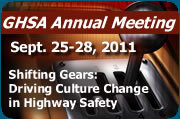State Highway Safety Group Broadens Drugged Driving Policy as National Summit Convenes
 |
Drugged Driving Summit to be Held October 14
WASHINGTON--Oct. 13, 2011: The Governors Highway Safety Association (GHSA) announced today that it has strengthened its drugged driving policy during its recent Annual Meeting, held September 25-28 in Cincinnati. The new policy supports elevating drugged driving to a national priority and calls upon states to undertake several strategies to address this emerging highway safety issue. GHSA wants states to implement strategies in detection, enforcement and prosecution, among other areas. GHSA's call to action comes as The White House Office of National Drug Control Policy convenes a drugged driving summit in Washington, D.C. on October 14.
A host of research has indicated the severity of the drugged driving problem. A 2007 roadside survey by the National Highway Traffic Safety Administration (NHTSA) revealed that 11 percent of daytime drivers and 14.4 percent of nighttime drivers tested positive for some type of drugs in their system. While the presence of drugs does not necessarily imply driver impairment, the high prevalence of drugged drivers has raised concerns.
Last fall, NHTSA reported that 33 percent of all drivers with known drug-test results who were killed in motor vehicle crashes in 2009 tested positive for drugs (both illegal and over-the counter and prescription medications). Another recent NHTSA report indicated drug use reported by states among fatally injured drivers increased from 13 percent in 2005 to 18 percent in 2008 (the most recent year that data is available).
Barbara Harsha, GHSA's Executive Director, says, "Both state and national data indicate that drugged driving is a growing problem that demands more attention. The Association supports a broad approach to address this challenge. As with drunk driving, a strong national-state partnership is necessary to make progress."
The new GHSA policy encourages states to:
- Amend statutes to provide separate and distinct sanctions for alcohol and drug-impaired driving;
- Develop standard protocols or procedures for drug testing labs to use in identifying drugs that impair driving;
- Provide increased training to law enforcement on identifying drugged drivers utilizing approaches such as the Advanced Roadside Impaired Driving Enforcement (ARIDE);
- Increase the testing and reporting of drug testing information on fatally injured drivers; and
- Provide increased training to prosecutors to help in successful prosecution of drug-impaired drivers.
In addition, GHSA is calling for much more drugged driving research. Studies are needed to understand the scope of the problem, to improve field testing of drugged drivers and to set impairments standards. According to Harsha, "Any countermeasures for drugged driving must be based on research and data. The highway safety research community should make this a priority."


